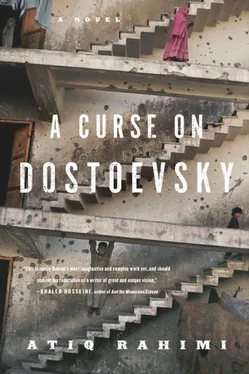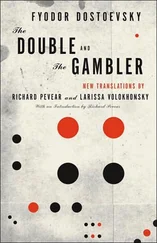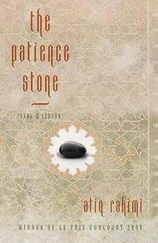No.
Does God really exist, as Dostoevsky said, to prevent man from committing suicide?
That’s it, you’re off again! No, Rassoul, he was thinking of something else. Your Allah, on the other hand, allows suicide only as a way of bearing witness to his existence and his glory. Any suicide beyond that robs him of his name Al-Mumit , he who deals death.
The pistol slips from his hands.
And so it ends. He will not commit suicide, he cannot. Suicide requires just one thing: the action, and nothing more. No thoughts, no words, no remorse, no regret, no hope, no despair…
Dawn, bolder than Rassoul, ravages the sky, picking off the stars one by one.
And sleep, more rapacious even than dawn, takes over Rassoul’s exhausted body.
ASOFT, gentle murmur ripples through the room, close to him. Through half-open eyes he can only make out a shape: the ethereal face of a wide-eyed young woman. She is whispering: “Rassoul?” It’s a lovely dream. “Rassoul!” the voice becomes anxious, loud, forcing him to open his eyes. “Are you OK?”
Sophia? How long has she been here? What time is it? Rassoul stares dully at his Russian alarm clock, which still isn’t working—it hasn’t worked for ages, he just looks at it out of habit, or “chronic absurdity” as he says.
He sits up and turns toward the window. The sky is still smoky and full of ashes. The sun doesn’t know where to appear. It will not appear. It is waiting for the earth to turn.
“What’s going on?” asks Sophia, still staring at him anxiously. Rassoul feels for the pistol, and picks it up. “Since when have you been carrying a gun?” she asks suspiciously. He puts it back down so he can pick up a cigarette, making out that he doesn’t feel like replying so she doesn’t realize that he can’t speak, even though he knows how stupid that is. “My mother told me about your father, may God bless his soul. But why didn’t you say? Why didn’t you go to the burial?” She takes Rassoul’s hands in her own. “Now I understand your silence, your sadness…” No, Sophia, you don’t understand a thing. You ask these questions, when you know that the death of Rassoul’s father means nothing to him. It’s been a long time that they’ve been estranged, on both sides. He told you that. He is simply worried for his mother and his sister. He must rescue them. But that too is another story. Rassoul is thinking about one thing and one thing only: Where were you that night? Look at him carefully. Listen to his silence.
“Rassoul, I’ve gone back to work for Nana Alia.” He knows that. “I do love you, I promise, but I have to work. If I don’t work, who will? My mother? My brother? You know what our lives are like. I swear to you, when Nazigol came over last night my mother threw herself at her feet, begging to go in my place. But Nazigol wouldn’t take her. They don’t want her.”
They don’t want her?
Who is this they ?
Sophia stifles a sob and continues: “Last time you told me that I shouldn’t work there because people would talk, I didn’t go. And what happened? A week of starvation, a week of poverty. And who took care of us, that week?” She bursts into tears. “We can’t expect anything from you, either. And now you have your mother and sister to look after as well. And you need help yourself. So listen to me. I know it’s hard for you to accept, but tell me, Rassoul, do I have any choice?” No, she has no choice. And as she said, Rassoul, you no longer have anything to give her. You are empty. You are nothing. Incapable of suicide, incapable of sorting yourself out, or of protecting your sister and mother; you have even less, therefore, to offer Sophia and her family. You are not ashamed of your hopelessness, your apathy, and yet you feel dishonored and humiliated by what Sophia is doing. She, she is more innocent, purer, more worthy than you. Throw yourself at her feet, and cry out: “ I do not bow down to you, I bow down to all the suffering of humanity.” Go on!
He trembles.
See, you can’t even utter your hero Raskolnikov’s most magnificent sentence, but you keep on feigning his nerve. What a wretch!
His hands come together, clasp each other, as if in prayer. His head sinks into his shoulders. He writhes, and is broken. He understands that dignity is neither a stupid manly code of honor nor an absurd tribal morality, but simply the will of a being who admits his own weakness, and demands it be respected.
“Where did this money come from?” asks Sophia, holding out the bundle of notes he gave to Dawoud.
Now you’re going to have to write, Rassoul. You can’t just stay silent, leaving Sophia in the dark. She’ll probably end up thinking that you stole the money from Nana Alia. She and Nazigol must have noticed how strangely you were behaving the other day.
Yes, I’ll write it all down for her. This money comes from my mother’s sale of my sister Donia to a commandant. It’s the price of my cowardice!
More and more agitated, he stands up to look for some paper and a pencil. Sophia stares at him curiously: “You need this money for your mother and your sister…” Rassoul finds Sophia’s notebook. “I love you, Rassoul. But I can’t live with you. Or, rather, you cannot live with me,” she says, standing up to put on her chador and leave. But before she walks out of the door Rassoul stops her and hands over the notebook. “What is it? It’s…” she hesitates, “Is it my notebook?” Yes. “My notebook!” she exclaims vaguely, flooded with memories, smiling shyly. Rassoul gestures that she should open it. She does. He rushes over and turns to the final page, which she reads, rereads quietly to herself, and finally repeats out loud: “Today, I killed Nana Alia.” She looks up, not sure she has understood. She walks over to Rassoul. “What does this mean?” He points to the next sentence, and she reads it: “ I killed her for you, Sophia,” then the next: “Sophia, I have never kissed you. Do you know why?… ” She shuts the notebook, looks down as if searching anywhere but Rassoul’s lips for the meaning of the words. “Is it a poem?” she asks candidly. No, I killed. He tries to act it out, in vain. He looks right into her eyes in a fury, a dull fury at his inability to tell her everything. “Stop looking at me like that! You’re scaring me. Tell me what it is?” Go on, Rassoul, write down that you’ve lost your voice. “Why won’t you say anything? Have you really decided to stop talking?”
Distraught, he nods “yes,” and sits back down on the bed. He almost picks up the pencil and writes, but something stops him. Something cynical. He still doesn’t know the cause of this resentment. Probably the fact that his silence annoys everyone, especially those who love him. And yet he does want to tell Sophia, in great detail, exactly how he came up with the idea of killing Nana Alia. It was when they quarreled, a week ago. Afterward he went to the teahouse and heard two militiamen talking about Nana Alia, the filthy whore who wasn’t just a moneylender. She had young girls working for her, ostensibly to do the cleaning but in fact for liaisons with her clients. Rassoul suddenly realized why she wanted Sophia to work late into the night. He couldn’t bear it. Yes, that was when he had the idea. The next day…
“No, you cannot…,” she murmurs. “You cannot kill,” she repeats, as if she has already heard Rassoul’s whole story. She doesn’t believe it, will never believe it. Whatever he might say, or rather write, would simply be lying.
Yes, your story is just an absurd pastiche of Crime and Punishment , which you’ve described to her a hundred times, and that’s all it is.
Читать дальше












